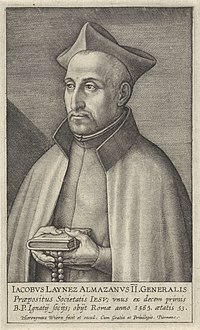Diego Laynez
He was one of the seven men who,[1] with Ignatius, formed the original group of Friends in the Lord, later the Society of Jesus, taking, in the Montmartre church, the vows of personal poverty and chastity in the footsteps of Christ, and committing themselves to going to Jerusalem.
Because of unfavourable circumstances (no ship going to the Holy Land) the pilgrimage to Jerusalem fell through, and Laynez with Ignatius of Loyola and the other Friends in the Lord (by then they were ten) offered their services to the Pope.
Laynez's famous speech on imputed and inherent justification (Girolamo Seripando's “double justice” theory) on 26 October 1546 was subsequently written out and incorporated into the Acta of the Council under the title "Disputatio de justitia imputata".
[clarification needed] In his three-hour-long speech, which was widely regarded as the most thorough on the topic, Laynez gave 12 reasons that the proposed “double justice” must be rejected by the Church, including its relatively recent origin and its implied denial of merit.
His arguments were consistent with the Council's 13 January 1547 Decree on Justification, which taught in Chapter 16, “we must believe that nothing further is wanting to those justified to prevent them from being considered to have, by those very works which have been done in God, fully satisfied the divine law according to the state of this life and to have truly merited eternal life.” Laynez did not participate directly in the several months of discussions between his speech and the issuing of the Decree because immediately after his speech on justification, Cardinal Del Monte assigned him – along with Salmeron – to prepare a list of Protestant errors regarding the sacraments, as well as a summary of the relevant Church documents and patristic writings on sacraments.
He spent the time between the first and second period of the Council contributing to the reform of prostitutes, convents and dioceses, preaching in Florence, Venice and then in Sicily.
From there, he accompanied John de Vaga's fleet on a successful raid of Tripoli, which had been a base for Muslim pirates; he was still in Africa on 5 October 1550 when he was called to Rome.
Immediately after his speech, he began the preliminary work for the council's consideration of penance and extreme unction, which he, with Salmeron, presented on 20 October.
Before leaving Trent, however, he met with Melchior Cano, the influential Spanish Dominican, who was embarrassed by his countryman's threadbare cassock and was suspicious of the new religious order.
On 31 July 1916 they were transferred to the Church of the Sacred Heart and Saint Francis Borgia on Calle de la Flor Baja.
